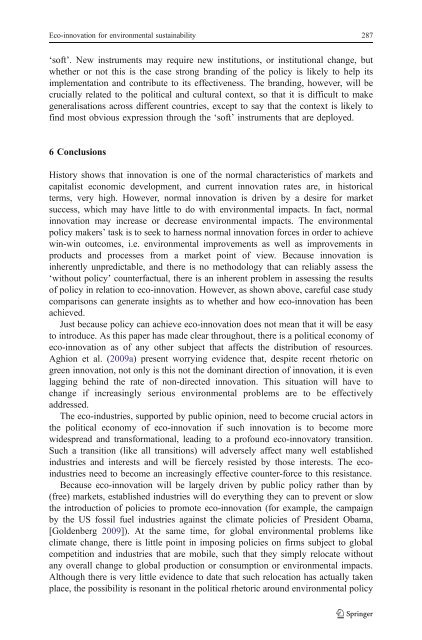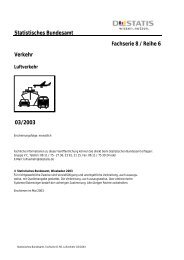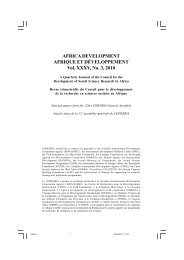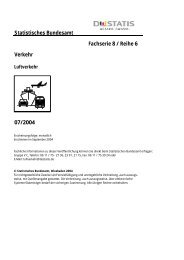The international economics of resources and resource ... - Index of
The international economics of resources and resource ... - Index of
The international economics of resources and resource ... - Index of
You also want an ePaper? Increase the reach of your titles
YUMPU automatically turns print PDFs into web optimized ePapers that Google loves.
Eco-innovation for environmental sustainability 287<br />
‘s<strong>of</strong>t’. New instruments may require new institutions, or institutional change, but<br />
whether or not this is the case strong br<strong>and</strong>ing <strong>of</strong> the policy is likely to help its<br />
implementation <strong>and</strong> contribute to its effectiveness. <strong>The</strong> br<strong>and</strong>ing, however, will be<br />
crucially related to the political <strong>and</strong> cultural context, so that it is difficult to make<br />
generalisations across different countries, except to say that the context is likely to<br />
find most obvious expression through the ‘s<strong>of</strong>t’ instruments that are deployed.<br />
6 Conclusions<br />
History shows that innovation is one <strong>of</strong> the normal characteristics <strong>of</strong> markets <strong>and</strong><br />
capitalist economic development, <strong>and</strong> current innovation rates are, in historical<br />
terms, very high. However, normal innovation is driven by a desire for market<br />
success, which may have little to do with environmental impacts. In fact, normal<br />
innovation may increase or decrease environmental impacts. <strong>The</strong> environmental<br />
policy makers’ task is to seek to harness normal innovation forces in order to achieve<br />
win-win outcomes, i.e. environmental improvements as well as improvements in<br />
products <strong>and</strong> processes from a market point <strong>of</strong> view. Because innovation is<br />
inherently unpredictable, <strong>and</strong> there is no methodology that can reliably assess the<br />
‘without policy’ counterfactual, there is an inherent problem in assessing the results<br />
<strong>of</strong> policy in relation to eco-innovation. However, as shown above, careful case study<br />
comparisons can generate insights as to whether <strong>and</strong> how eco-innovation has been<br />
achieved.<br />
Just because policy can achieve eco-innovation does not mean that it will be easy<br />
to introduce. As this paper has made clear throughout, there is a political economy <strong>of</strong><br />
eco-innovation as <strong>of</strong> any other subject that affects the distribution <strong>of</strong> <strong><strong>resource</strong>s</strong>.<br />
Aghion et al. (2009a) present worrying evidence that, despite recent rhetoric on<br />
green innovation, not only is this not the dominant direction <strong>of</strong> innovation, it is even<br />
lagging behind the rate <strong>of</strong> non-directed innovation. This situation will have to<br />
change if increasingly serious environmental problems are to be effectively<br />
addressed.<br />
<strong>The</strong> eco-industries, supported by public opinion, need to become crucial actors in<br />
the political economy <strong>of</strong> eco-innovation if such innovation is to become more<br />
widespread <strong>and</strong> transformational, leading to a pr<strong>of</strong>ound eco-innovatory transition.<br />
Such a transition (like all transitions) will adversely affect many well established<br />
industries <strong>and</strong> interests <strong>and</strong> will be fiercely resisted by those interests. <strong>The</strong> ecoindustries<br />
need to become an increasingly effective counter-force to this resistance.<br />
Because eco-innovation will be largely driven by public policy rather than by<br />
(free) markets, established industries will do everything they can to prevent or slow<br />
the introduction <strong>of</strong> policies to promote eco-innovation (for example, the campaign<br />
by the US fossil fuel industries against the climate policies <strong>of</strong> President Obama,<br />
[Goldenberg 2009]). At the same time, for global environmental problems like<br />
climate change, there is little point in imposing policies on firms subject to global<br />
competition <strong>and</strong> industries that are mobile, such that they simply relocate without<br />
any overall change to global production or consumption or environmental impacts.<br />
Although there is very little evidence to date that such relocation has actually taken<br />
place, the possibility is resonant in the political rhetoric around environmental policy








